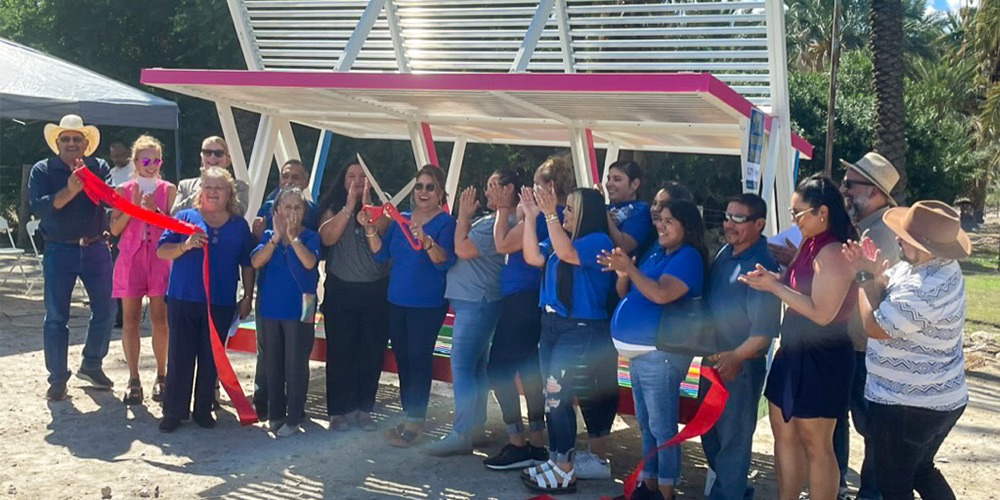New shade shelter prototype aims to keep transit riders cool
Community-driven research strives to prevent heat-related illnesses
Collaborators celebrate the unveiling of a new bus shelter in Oasis, California.
Waiting for the bus can be dangerously hot — but shaded bus stops can offer relief, especially in desert communities like Oasis, California.
A new prototype shade structure unveiled this month in Oasis aims to protect riders and prevent heat-related illnesses. The project is a collaboration between the UCLA Luskin Center for Innovation, Kounkuey Design Initiative, SunLine Transit Agency and the Oasis Leadership Committee.
For the past two years, the team has been conducting a heat impacts study to understand how rising temperatures are affecting local residents. The study identified lack of shade as a major cause for heat-related illnesses.
“Oasis is a shade desert, meaning the community has limited access to shelter from the sun,” said V. Kelly Turner, co-director of the UCLA Luskin Center for Innovation. “This lack of protection can be particularly harmful for bus riders who, like others spending prolonged time outdoors, risk heat stroke and other health impacts as they wait at unsheltered transit stops.”
The research team found that creating more shade can help alleviate some of the problems caused by extreme heat in Oasis.
Through design workshops, the team gathered input from community members to understand local needs. Residents determined how this shade structure should look and what features it should include. The resulting bus shelter is made with heat-resistant materials and contains slats for cool air to flow through.
The new shade structure is a prototype that may be replicated in other parts of Oasis, depending on community feedback after a month-long demonstration period. Results from this demonstration will be used to improve the prototype and explore different cooling options, like planting trees.
Funded by the California Strategic Growth Council, this project is part of a larger grant led by V. Kelly Turner to guide local solutions to heat mitigation. The grant aims to empower communities to implement cooling solutions for bus stops and other streetscapes to facilitate the increased use of transit and active transportation — both reducing pollution and creating climate-resilient neighborhoods. The project collaborates with frontline communities of Eastern Coachella Valley, Ontario, Pacoima in the Northeast San Fernando Valley of L.A., and Watts in South L.A.








